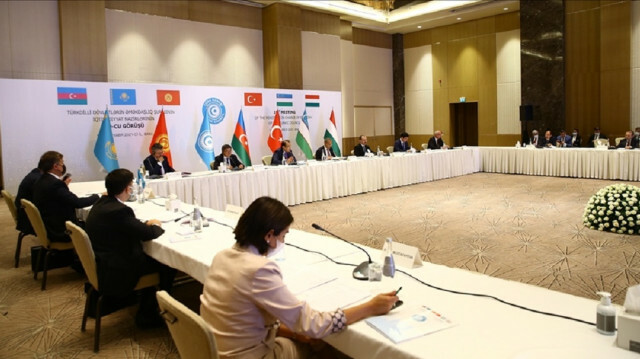
Turkish trade minister calls for preferential trade arrangements among member countries
The lifting of transport quotas and liberalization of transports among Turkic Council countries are of critical importance, said Turkey's trade minister on Friday.
Attending the 10th meeting of the ministers of economy of the Turkic Council in Baku, the capital of Azerbaijan, Mehmet Mus said the Baku-Tbilisi-Kars route should be used more effectively in logistic operations among the member countries.
Although there are periodic improvements among the countries, the road pass documents are in any case quite insufficient, he said, adding: “Regional and holistic efforts should be made to facilitate transportation and reduce transportation costs.”
“The Baku-Tbilisi-Kars railway line, which is a strategic component of the physical connection among the member states of the Turkic Council, is of great importance in terms of the revival of the Silk Road, which is the historical source of prosperity of the Turkic world, and the convergence of the countries.”
He stated that with the closure of the Iran-Turkmenistan border during the pandemic, the capacity of this railway line was increased, reaffirming the importance of this railway as a strategic transportation route.
He added that determining a competitive and reasonable tariff in the Caspian crossings, making sure that this route continues in the post-pandemic period, is quite critical.
“As Turkey, we are ready to support all steps in this regard,” he underlined.
- Cooperation in digital, green economy
The minister also noted that the Turkic Council secretariat should develop projects to increase cooperation, especially in the fields of digital economy and transition to a green economy.
“Structural reforms aimed at diversifying economies are of vital importance, especially in eliminating the vulnerabilities against climate change,” he said.
He also stated that the Turkic Council countries have a young and dynamic population of 160 million and an economic size of $1.1 trillion.
It is important to develop preferential trade arrangements among the member countries, he underlined, giving an example of the one signed with Azerbaijan.
“We have put the agreement into effect this year, aiming to conclude negotiations on another one with Uzbekistan this year,” he added.
“In order for our companies to act more courageously in trade with national currencies, both our governments and central banks must take confidence-building steps," he added.
Turkic Council Joint Investment Fund will be one of the most important supporting elements of the structural transformation in member countries, he underlined.
*Writing by Aysu Bicer in Ankara

